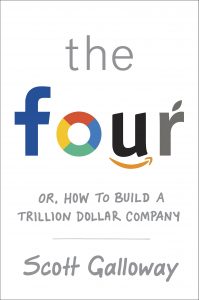
Most interesting aspect is how Scott looks at the base emotions that each of the 4 tech companies have managed to connect with e.g. Apple is like connecting with God, Amazon taps into our basic instict to hoard (uncertain future), etc.
Factors that make the 4. T algorithm
1. Product differentiation
2. Visionary capital
3. Global reach
4. Likability
5. Vertical integration. Control distribution, manufacturing etc.
6. AI. What do you do with data
7. Career Accelerant. Ability to attract talent.
8. Geography matters. Proximity to top schools.
Skills to success
– talent
– pleasant with others
– high emotional maturity. Handle ambiguity.
– staying curious. Come up with crazy ideas
– ownership. More obsessed with details. Own the task, project and business
– go to top tier college
– accomplishment habit. Winner in one field will thrive in others too. Compete. Bravery and action orientation.
– location. Go where the action is. Super cities. In your country, continent or global. How soon did you get there.
– sell yourself. Choose your medium. Spend time everyday in talking and building your network.
– ask for equity.
– manage your finances. Save. 78% of NFL athletes under financial stress or bankrupt.
– actively manage your career.
– don’t seek justice. Corporate world is unfair. Never complain.
– regression to the mean. get up and keep walking
– go where your skill is valued.
– keeping physically fit. And mentally too.
– ask for and give help regularly.
– what stage of the business do you shine at. Startup(entrepreneurs), growth(visionary), mature(operator), decline(pragmatist).
– is the long tail booming or dying. If booming work in a startup in that industry rather than leader. Eg consumer products.
# Key Takeaways from The Four:
1. The Four companies (Amazon, Apple, Facebook, and Google) have become dominant players in the tech industry due to their relentless focus on innovation, customer experience, and data-driven decision making.
2. These companies have disrupted traditional industries and have changed the way we live, work, and communicate.
3. The Four have a strong culture of experimentation and risk-taking, which has allowed them to constantly evolve and stay ahead of their competitors.
4. The Four have also faced criticism for their impact on society, including issues of privacy, data security, and monopoly power.
# Practical Application of The Four:
1. The concepts and strategies presented in The Four can be applied in real-world scenarios by understanding the importance of innovation, customer experience, and data-driven decision making.
2. Companies can learn from The Four’s culture of experimentation and risk-taking by encouraging their employees to think outside the box and try new ideas.
3. The Four’s focus on constantly evolving and staying ahead of competitors can be applied by regularly reviewing and updating business strategies and processes.
4. The Four’s impact on society can be mitigated by implementing ethical and responsible practices, such as protecting user data and promoting diversity and inclusion.
# Valuable Insights for Leaders and Managers:
1. Chapter 3, “The New Rules of the Game,” offers valuable insights for leaders and managers on how to create a culture of innovation and experimentation within their organizations.
2. Chapter 5, “The New Age of Creativity,” provides valuable insights on how to foster creativity and encourage employees to think outside the box.
3. Chapter 7, “The New Age of Data,” offers valuable insights on how to use data to make informed decisions and stay ahead of competitors.
# Case Studies and Examples:
1. The case study of Amazon’s acquisition of Whole Foods in Chapter 4, “The New Age of Ecosystems,” effectively illustrates the power of partnerships and ecosystems in driving growth and innovation.
2. The example of Facebook’s acquisition of Instagram in Chapter 6, “The New Age of Social,” effectively demonstrates the importance of staying ahead of trends and adapting to changing consumer preferences.
3. The case study of Google’s self-driving car project in Chapter 8, “The New Age of Intelligence,” effectively showcases the potential of artificial intelligence and machine learning in transforming industries.
Leave a Reply